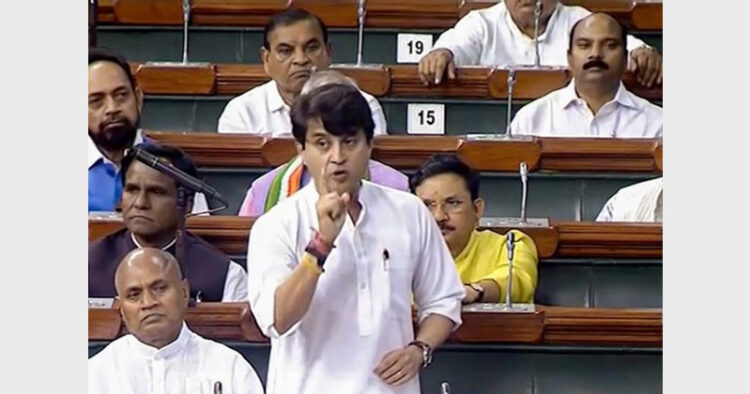Civil Aviation Minister Scindia lashed out at the UPA regime for their 'wrong decisions' that led to the dilapidated financial situation of Air India and said Air India's losses kept on increasing under UPA regime,
New Delhi: "I was silent about this, did not want to say anything about Air India but you want to speak about truth… so now can hear the truth," said Civil Aviation Minister Jyotiraditya Scindia in Lok Sabha, exposing the Congress-led UPA regime's fault line for the mess the national carrier had landed.
He said in Lok Sabha that the decision to merge Air India and Indian Airlines with completely different work cultures, purchase of 111
aircraft, liberalisation of bilateral rights, which Indian air carriers could not fulfil, pushed Air India to post a daily loss of Rs 20 crore.
Responding to the debate on the 'Demands for Grants of the Aviation Ministry' Scindia raised questions on the former PM Manmohan Singh-led UPA government, which was in power at the Centre till 2014, on their measures to revive and support the aviation company.
"Before 2005, Air India was making a profit of Rs 15 crore per annum and Indian Airlines was making profit of Rs 50 crore. These airlines were made to purchase 111 aircraft at a cost of Rs 50-55,000 crore which pushed the national carrier into deep debts," Mr Scindia said.
As opposition members, including Gaurav Gogoi of Congress, stood up in protest, Scindia said he had not referred to Air India at all but was forced to speak after Trinamool leader Sudeep Bandyopadhaya and Congress leader Adhir Ranjan Chowdhury raised the issue.
"After the purchase of 111 aircraft during the UPA government and the merger of Air India and Indian Airlines, the condition of Air India
went on deteriorating," he said.
Scindia lashed out at the UPA regime for their 'wrong decisions' that led to the dilapidated financial situation of the air flier. Even Congress president Sonia Gandhi was present in the House. He said under UPA, "Air India's losses kept on increasing."
"Due to the wrong decisions taken during the UPA government, the financial condition of Air India continued to deteriorate, the losses kept increasing. Air India, which was in profit of 14-15 crores in 2005-06, had to face a loss of 85 thousand crores in the next 14 years," the Union Minister said.
Scindia also addressed the concerns voiced by some MPs, including N K Premachandran of RSP from Kerala, about the future of Air India employees.
"As per the agreement of disinvestment with Tata on Air India, the employees cannot be fired and if he wants to remove someone after one year, then that too can be done only through VRS scheme, the government is committed to providing medical facilities to Air India employees based on CGHS and NHA," he informed.
He said the losses of 14 years had accumulated to Rs 85,000 crore, the equity infusion had cost the government Rs 54,000 crore, grants to the airline totalling Rs 50,000 crore, and net debt of Rs 66,000 crore had left Air India staring at a chasm of Rs 2.5 lakh crore.
"It is under these circumstances the Prime Minister took a decision to put an end to these losses. He decided on disinvestment of Air India to protect the money of 135 crore Indians and put it to good use through schemes such as Ujjwala, Jal Jeevan Mission," Scindia said.
Of course, what remains to be stated is that during the Manmohan Singh government, Praful Patel of NCP and a Sharad Pawar loyalist was the Civil Aviation Minister between May 23, 2004, and Jan 18, 2011. The portfolio then went to Vayalar Ravi of Congress. Patel had lost the 2004 Lok Sabha polls, but as the UPA returned to power, Pawar had decided to make Praful Patel the Civil Aviation Minister.














Comments